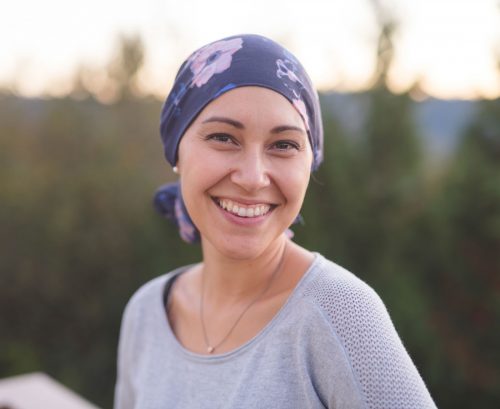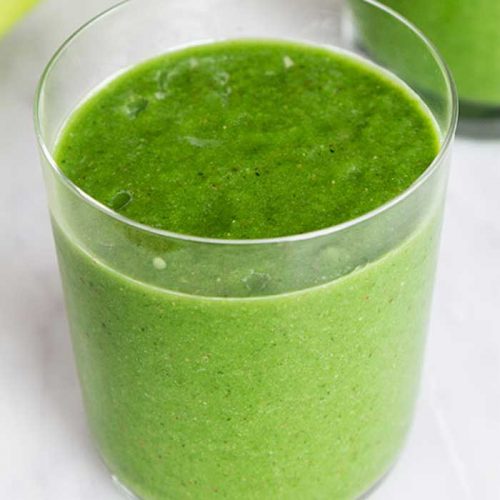
Chemotherapy and radiotherapy kill cancer cells, but also cause nausea, loss of appetite and changes to taste. Healthy Food Guide reveals how to overcome these side effects while navigating one of life’s biggest challenges.
With few families these days not affected by cancer in some way, dealing with cancer treatment and surgery is a common health issue. The treatment puts your body under a lot of stress, so it’s important to get optimal energy (kilojoules/calories) from the foods you eat, as well as meet your increased protein needs.
But this can be difficult to do. The cancer itself can cause problems such as fatigue, anxiety, depression and feeling full quickly. In fact, weight loss is often the first cancer symptom people notice, and is experienced by up to 80 per cent of people with cancer.
Cancer treatments can also affect your ability to eat well. Radiotherapy and chemotherapy often cause changes to taste and smell, as well as nausea, pain, diarrhoea and mucositis (inflammation and ulceration of the lining of the digestive tract). Surgery undertaken for cancer may also interfere with the absorption of nutrients.
One of the key things to remember is that this is not the time to deliberately try and lose weight, regardless of your weight prior to being diagnosed. Your aim should be to remain the same weight throughout treatment so your body can cope better with treatment and recover faster.
Cancer treatment side effects vary depending on the type of treatment a person undergoes. Try these practical tips for coping with some of the more commonly experienced ones.
Side effect: Fatigue
Extreme and constant tiredness — that often doesn’t improve with rest — can affect your appetite. It can also affect your motivation to prepare nutritious meals.
Solutions
- Plan ahead for when you’re too tired to cook. Prepare food in advance and store in single-serve portions in the freezer.
- Shop online for groceries if you don’t have the energy to go to the supermarket.
- Ask for help and accept offers from family and friends with grocery shopping and preparing nutritious meals.
- Use meal services such as Meals on Wheels or other food delivery companies that bring pre-prepared food to your door.
- Have meals together with others, as this will encourage your appetite, particularly when you are feeling too tired to eat.
Side effect: Taste and smell changes
These are usually temporary but can linger for a few weeks after treatment finishes. One common complaint is not being able to stomach meat or meat products. Because your protein requirements are higher during cancer treatment, if you can’t eat meat make sure your meals include cheese, tofu, kidney beans, eggs, fish and other protein-rich foods.
Solutions
- Marinate meat to alter its taste. Experiment with spices, herbs and lemon juice or use a store-bought marinade.
- Sprinkle a little sugar over bitter or salty foods.
- Add a pinch of salt to overly sweet foods.
Side effect: Reduced appetite
This is one of the most common side effects and can result from a combination of the cancer treatment making you feel unwell, being fatigued and generally feeling low.
Solutions
- Eat little and often, for example, every two to three hours. Large meals can put you off, reducing your appetite even further.
- Drink high-kilojoule/calorie liquids such as milkshakes, smoothies and juices. Have these after or between meals, rather than just before.
- Keep food on hand that’s easy to eat, such as soup, macaroni cheese and canned spaghetti.
- Eat what you feel like, when you feel like it. For example, have cereal for dinner or eat a main meal at lunchtime.
Side effect: Dehydration and dry mouth
Drinking sufficient fluids is especially important during cancer treatment. Using a straw can help you keep up your liquid intake.
Solutions
- Keep bottles of water, juice or ginger ale on hand to sip on regularly during the day.
- Eat broths and ice-blocks to boost your fluid intake.
- Drink lemonade or orange-flavoured soft drinks as tart flavours can help to increase saliva production.
- Moisten foods with sauces, spreads, gravy or dressings. Take a sip of fluid with every mouthful to help with chewing and swallowing. Don’t drink large amounts with meals as this can affect your appetite.
Side effect: Nausea
Feeling sick is not a pleasant sensation and you can be nauseous with or without vomiting.
Solutions
- Take anti-nausea medication as directed by your doctor.
- An empty stomach makes nausea worse, so eat small amounts of food regularly. Try snacking on nuts, muesli bars and plain crackers.
- If you can, avoid cooking smells — a great excuse to delegate the cooking to someone else!
- Limit the amount of fried and fatty foods you eat because these foods can often make you feel worse.
- Chilled foods or those at room temperature tend to have less aroma, so are less likely to cause nausea.
- Forget about traditional mealtimes. Eat at whatever time you’re feeling your best.
Side effect: Diarrhoea
Some chemotherapy drugs can cause bouts of diarrhoea. Diarrhoea can also be a side effect of radiotherapy to the pelvic area.
Solutions
- Drink plenty of fluids to prevent dehydration. Aim for at least eight glasses a day of diluted juices, flat soft drinks, weak tea, nutritional supplements, vegetable juices or broths.
- Avoid caffeinated drinks.
- Avoid spicy, fatty or very sweet foods.
- If you’re recovering from a bout of diarrhoea, bland foods such as banana, rice, toast and apples tend to be better tolerated.
- Talk to your nurse or doctor because there are many medications that can ease diarrhoea.
Other side effects
If you become constipated, keep up your fluids and maintain a good intake of fibrous foods (whole grains, legumes, fresh fruit and veg).
If your mouth is sore due to mucositis, soften the texture of foods (by blending, pureeing, finely chopping and mincing) to make them more palatable. You might also need high-energy supplement drinks to ensure you’re getting enough kilojoules and protein.
How to maximise your nutrition during cancer treatment
Your metabolism increases when you have cancer, so it’s essential to boost your protein and kilojoule/calorie intake to aid recovery. Try these easy ways:
Eat more kilojoules/calories
Add kilojoule-rich ingredients, such as olive oil, butter and cheese, to the foods you’re already eating. This may seem to go against all the healthy eating advice you’ve heard, but the most important thing you can do during cancer treatment is keep your weight steady.
Adding these ingredients to what you’re already eating means you won’t need to increase the amount of food you eat, which can be difficult if your appetite is diminished. Try the following:
- Add a liberal spread of butter to toast, vegetables and mashed potato, as well as a good drizzle of olive oil while cooking.
- Include avocado (sliced or mashed) in sandwiches.
- Make a high-protein ‘super’ milk to boost your kilojoule and protein intake. Do this by add six tablespoons of skim milk powder to a litre of milk.
- Add full-cream milk, milk powder, full-fat yoghurt, cheese and ice cream to meals.
- Get as many kilojoules as you can from fluids: have milky beverages like Milo, soups, juices, cordials and soft drinks.
Include protein in all meals and snacks
Protein helps your body recover from cancer treatment and surgery. To include high-protein foods every time you eat:
- Add peanut butter or ricotta to toast and crackers.
- Make a quick and easy breakfast with baked beans or eggs and cheese on toast.
- Add flavoured cans of tuna to pastas and sandwiches.
- If you can’t stomach meat, eat vegetarian patties, kidney beans and lentil dishes.
- Eat creamy pastas, soups and lasagnes instead of tomato-based versions.
- Snack on yoghurt topped with fresh fruit and nuts.
Drink extra nutrients
Try the specifically designed, ready-to-drink supplement drinks, such as Sustagen, Resource and Ensure, available from pharmacies. The Sustagen and Ensure Plus powders (also available from pharmacies) can be mixed with milk or water to drink, or sprinkled over ice-cream, custard and rice puddings to eat.
Talk to your dietitian, nurse or doctor to check these drinks are suitable for you. You may also qualify for a subsidy on their cost.
For more on cancer recovery you might be interested in:
Common side effects of treatment
- Poor appetite and weight loss
- Fatigue
- Changes in taste and smell
- Chewing and swallowing problems
- Dry mouth, nausea and vomiting
- Constipation
- Diarrhoea
- Other types of bowel irritation
- Heartburn
1 in 4
people with cancer are malnourished
What is malnutrition?
Malnutrition is when a person isn’t eating enough food or the right type of foods. Sometimes absorption issues in the digestive system can also cause malnutrition. People with cancer frequently don’t get enough energy and essential nutrients, which can cause unplanned weight loss. Around one in four people who have cancer are malnourished, which can detrimentally affect their cancer treatment. If you’re malnourished, your recovery time and length of stay in hospital will also be longer, so it’s really important you focus on getting the right nutrition while you are undergoing cancer treatment.
Article sources and references
- Better Health Channel. 2014. Cancer and malnutrition. Accessed June 2021https://www.betterhealth.vic.gov.au/health/conditionsandtreatments/cancer-and-malnutrition
- Cancer Council. 2021. Cancer side effects. Accessed June 2021https://www.cancer.org.au/cancer-information/cancer-side-effects
- Cancer Council Victoria. 2021. Nutrition. Accessed June 2021https://www.cancervic.org.au/living-with-cancer/nutrition/nutrition-overview
www.healthyfood.com










